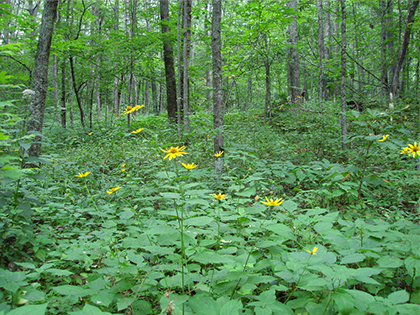CTNC recently purchased a property that contains an important portion of the Overmountain Victory National Historic Trail (OVT) near Spruce Pine and the Orchard at Altapass, and which is highly visible from the Blue Ridge Parkway.
The 128-acre property in McDowell County is located at the Heffner Gap Overlook (Parkway milepost 326) and is visible from both the Heffner Gap and Bear Den overlooks. The tract lies between two other properties that CTNC previously protected: the 1,488-acre CSX conservation easement and the 534-acre Rose Creek/OVT Natural Area, which is now managed by the North Carolina Wildlife Resources Commission as a state game land.
The tract contains a short but critical section of the OVT that links nearly 1.6 miles of the Trail on the CSX easement with a 1.3-mile section on the Rose Creek property. The OVT traces the route taken by colonial militia to the pivotal battle of Kings Mountain during the American Revolution.
National Park Service (NPS) Overmountain Victory National Historic Trail Superintendent Paul Carson said, “CTNC’s protection of this property will open up a new section of the trail for public use and we look forward to working with CTNC and the Blue Ridge Parkway to extend the trail for public enjoyment. It is especially exciting because so much of the surrounding landscape and views from the trail will remain as they were at the time the patriots traveled this route.”
Blue Ridge Parkway Superintendent Phil Francis added, “Stunning views from the Heffner Gap and Bear Den Overlooks will remain unspoiled because this property was conserved. It’s especially important since the tract is so close to the Parkway boundary.”
“Protecting this property will provide multiple benefits for generations to come,” said Reid Wilson, CTNC executive director. “Beautiful views from two Parkway overlooks are preserved, a portion of the Overmountain Victory Trail will connect two longer sections on either side for hikers, and the forest and wildlife habitat will remain healthy.”
CTNC purchased the property on December 21, 2012, for $700,000 from John & Anna Watson of Atlanta, GA with a $544,000 grant from the NC Department of Transportation’s Scenic Byways Program as well as funds from the NC Environmental Enhancement Grants Program and Fred & Alice Stanback of Salisbury.
CTNC anticipates transferring the property to the National Park Service to be incorporated within the official boundaries of the Blue Ridge Parkway unit and dedicated as an official section of the NPS Overmountain Victory National Historic Trail. The OVT will soon be open on the Heffner Gap tract.




 CTNC is like no other organization that works to protect our land and water. As a land trust, CTNC has safeguarded more than 30,000 acres of natural wonders along the Blue Ridge Parkway. And as a champion for the 23 local land trusts across the state, CTNC provides essential funding, advocacy and outreach so that those groups can conserve more land in the communities they serve.
CTNC is like no other organization that works to protect our land and water. As a land trust, CTNC has safeguarded more than 30,000 acres of natural wonders along the Blue Ridge Parkway. And as a champion for the 23 local land trusts across the state, CTNC provides essential funding, advocacy and outreach so that those groups can conserve more land in the communities they serve.